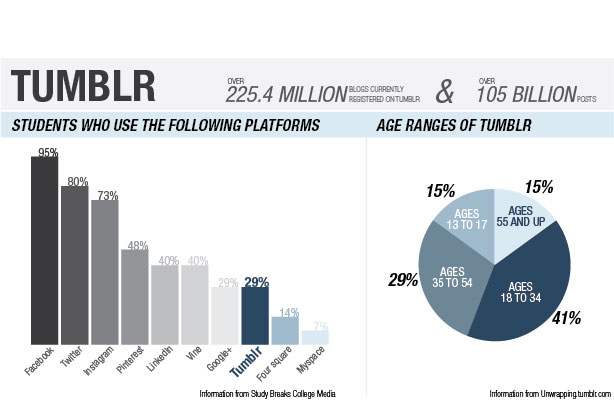Many viral Internet photos, memes and television fan theories often originate on Tumblr, founded in 2007 by David Karp as a social networking site that fosters connection through multimedia content. It has been designed for users to post text, photos, quotes, links, audio and video to their personal blogs.
“I actually run six different blogs,” said Emily Schmidt, a junior majoring in physics and secondary education. “I have my main blog, with stuff that I like. It’s got Star Trek, politics, just kind of everything that I’m into. I run the College Democrats blog. I have my UA blog, a selfie blog where I post a selfie every day, and an interior design blog. I also contribute to a blog, this Harry Potter group that I’ve been in since middle school.”
In addition to posting original content, users can reblog posts from other bloggers, send and receive questions, tag their posts so that they can be found when searched for and personalize their blogs with HTML coding.
The blogs on Tumblr can range from ones with photographs showcasing artistic expression to blogs entirely dedicated to posting anonymous opinions on television shows. Over 225.4 million blogs are currently registered on Tumblr, and there are over 105 billion posts.
“If you find someone who’s really intelligent on Tumblr, you can really get a lot of meat and angles out of it,” said Jack Blankenship, a senior majoring in telecommunication and film. “You can find a person’s own perspective without any spin.”
Because of Tumblr’s diverse content and personal atmosphere, strong communities tend to develop around a variety of subjects. Groups that are often marginalized, such as LGBTQ+ communities or those who suffer from mental illnesses, often use the site to reach out and connect with those who share their struggles.
“If you can’t necessarily find someone to connect with in your real life, you can still find someone to connect with on Tumblr,” Schmidt said.
Tumblr has not only helped connect large communities online, the blogging site has helped create tangible ties in the real world as well. Schmidt said she found her freshman roommates through the website.
With all of the examples of connections made and communities found, it can be easy to overlook the negativity and sometimes toxic nature of Tumblr.
“The worst is, especially when you get into the different fandoms, all of the drama,” said Helmi Henkin, a freshman majoring in psychology. “Especially in the Taylor Swift fandom, after Taylor made a Tumblr, there became so much competition.”
Schmidt said one of the biggest issues on Tumblr is the lack of fact-checking. When a controversial post gains traction, it may foster inaccuracy.
If one can look past all of the memes, GIFs and dramatics that frequent Tumblr dashboards, it can be a welcoming community. Henkin said she goes out of her way to remind her followers that her blog is a safe place for anyone who needs someone to talk to.









